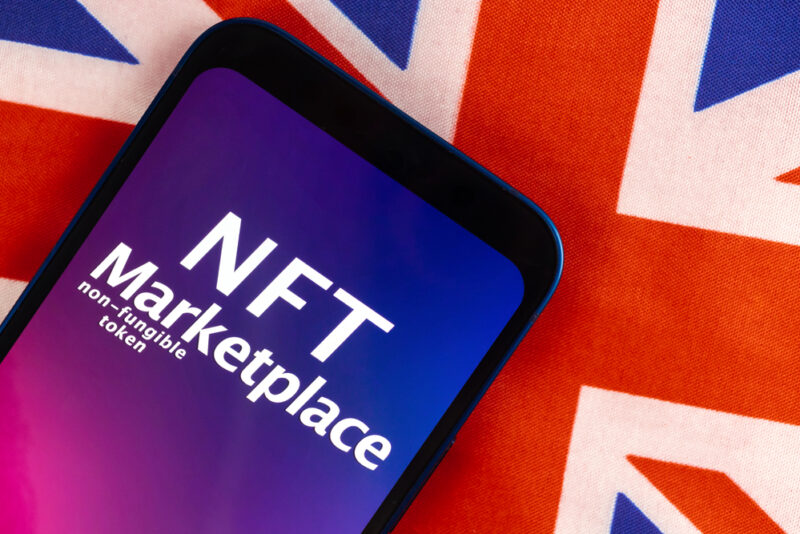On Monday, the UK government announced plans to create its own NFT as part of a bid to become a “global leader” in the cryptocurrency space.
Rishi Sunak, the Finance Minister, has requested the Royal Mint — the government-owned corporation responsible for minting coins in the United Kingdom — to make and issue the NFT before the summer, John Glen, City Minister said at a fintech conference in London.
NFTs are virtual assets that use blockchain, the technology that supports many crypto coins, to indicate ownership of a digital item such as a video game character or artwork. They have acquired a lot of traction in the last year thanks to celebrity endorsements and corporate sponsorships.
The NFT program, according to Glen, is part of a bigger government effort to “lead the way” in cryptocurrencies. Moreover, the minister announced that the UK will take a variety of steps to improve regulatory control of virtual assets, including plans to:
- Bring stablecoins into compliance with the UK’s current electronic payment legislation.
- Consult on developing a global-leading system for governing the trade of other digital currencies, including Bitcoin.
- Ask that the Law Commission examine the legal standpoint of DAOs, decentralized autonomous organizations. These are blockchain-based societies.
- Evaluate how DeFi (decentralized finance) loans and “staking,” which enables cryptocurrency users to earn interest on funds, are taxed.
- Establish a Cryptoasset Engagement Group, which ministers will lead and include reps from British authorities and cryptocurrency companies.
- Investigate the use of blockchain technology in the issuance of debt instruments.
Glen also stated that people should not think of regulations as a rigid or static thing. He believes that it should be thought of as a type of code that people can rewrite and refine as and when needed.
In the crypto business, stablecoins, or cryptocurrencies whose value is obtained from sovereign currencies such as the US dollar, are a quickly growing but controversial phenomenon. Tether, the world’s largest stablecoin, has a circulating circulation of more than $80 billion. The lack of transparency regarding the token’s reserves, on the other hand, has been criticized. The government now aims to regulate stablecoins in the UK.
The authorities were “widening” their search to cover other aspects of cryptocurrencies, such as Web3, a movement that pushes for a more decentralized web depending on blockchain technology, according to Glen.
Furthermore, Glen continues to explain that nobody knows for sure how Web3 will appear; however, there is a good probability that blockchain will play a key role in its evolution.
They want the UK to be at the forefront of economic development, which means always looking for the best opportunities.
The government’s NFT ambitions were met with skepticism by the global strategy director for crypto at fintech consultancy Mauricio Magaldi. In an emailed reply, he claimed the decision looks to be nothing more than a calculated PR play. However, he continued that talk of the United Kingdom becoming a ‘crypto hub’ appears to hold considerably more promise.
Are There Any Mixed Signals?
As policymakers around the world continue to take a closer look at the $2 trillion sector, industry insiders have been demanding clarity on the United Kingdom’s position on cryptocurrency.
President Joe Biden of the United States signed an executive order last month pushing government-wide coordination on cryptocurrency regulation. The move was widely regarded as beneficial to the industry.
Nevertheless, politicians in the EU recently voted against proposals that would have jeopardized the future of cryptocurrency mining. They did, however, approve new restrictions prohibiting anonymous cryptocurrency transfers.
Officials in the United Kingdom have taken a hard line on virtual assets.
The Financial Conduct Authority has turned down the great majority of cryptocurrency companies that applied for registration, citing concerns that too many “financial crime red flags” are going unreported.
Last week, the FCA postponed a vital deadline for cryptocurrency firms on a provisional register to acquire full permission, including Copper and Revolut. Copper has former UK finance minister, Philip Hammond as an advisor.
After failing to make it onto the final register, some organizations, including B2C2, Blockchain.com, and Wirex, have been forced to shut down their UK cryptocurrency activities and relocate offshore. The FCA has only approved 33 companies.
WeInvests is a financial portal-based research agency. We do our utmost best to offer reliable and unbiased information about crypto, finance, trading and stocks. However, we do not offer financial advice and users should always carry out their own research.
Read More













